
What We Are Investigating?
Our firm is launching a comprehensive investigation into Alex Kleyner over allegations that it has been suppressing critical reviews and unfavorable Google search results by fraudulently misusing DMCA takedown notices. These actions, if proven, could constitute serious legal violations—including impersonation, fraud, and perjury.
We conducted comprehensive analyses of fraudulent copyright takedown requests, meritless legal complaints, and other unlawful efforts to suppress public access to critical information. Our reporting sheds light on the prevalence and modus operandi of a structured censorship network, often funded and used by criminal enterprises, oligarchs and criminal entities seeking to manipulate public perception and bypass AML checks conducted by financial organisations.
The fake DMCA notices in this investigation appears to have been strategically deployed to remove negative content from Google search results illegally. Based on this pattern, we have reasonable grounds to infer that Alex Kleyner - or an entity acting at its behest - is directly or indirectly complicit in this cyber crime.
In most such cases, such ops are executed by rogue, fly-by-night 'Online Reputation Management' agencies acting on behalf of their clients. If evidence establishes that the subject knowingly benefited from or facilitated this scam, it may be deemed an 'accomplice' or an 'accessory' to the crime.

What are they trying to censor
Alex Kleyner, a real estate investor and entrepreneur, has been the subject of numerous allegations and adverse news reports that have cast a shadow over his professional reputation. While Kleyner has achieved notable success in the real estate sector, his career has been marred by controversies, legal disputes, and accusations of unethical behavior. Below is a summary of the major allegations, red flags, and adverse news associated with Kleyner, along with an analysis of why he might seek to suppress this information, potentially resorting to cybercrime.
Major Allegations and Red Flags
Fraud and Misrepresentation: Kleyner has faced allegations of fraudulent practices in his real estate dealings. Critics and former business partners have accused him of misrepresenting property values, concealing defects in properties, and engaging in deceptive sales tactics. These allegations have led to lawsuits and regulatory scrutiny, tarnishing his credibility as a real estate professional.
Unpaid Debts and Contract Disputes: Kleyner has been involved in multiple legal disputes over unpaid debts and breached contracts. Former contractors, vendors, and business associates have accused him of failing to honor financial agreements, leading to lawsuits and judgments against him. These cases paint a picture of financial mismanagement and unreliability.
Exploitation of Legal Loopholes: Kleyner has been criticized for exploiting legal loopholes to evade accountability. Reports suggest that he has used complex corporate structures and bankruptcy filings to shield himself from financial liabilities, leaving creditors and partners uncompensated. This behavior has raised ethical concerns and damaged his reputation.
Aggressive Business Tactics: Kleyner has been accused of employing aggressive and unethical tactics to pressure sellers and competitors. These include leveraging legal threats, manipulating market conditions, and engaging in predatory practices to gain an advantage in real estate transactions. Such behavior has alienated industry peers and drawn public criticism.
Negative Media Coverage: Kleyner has been the subject of unflattering media reports, including investigative pieces highlighting his alleged misconduct. These stories have amplified the allegations against him, further eroding public trust and making it difficult for him to rebuild his reputation.
Reputation Damage and Motives for Suppression
The allegations against Kleyner have significantly harmed his reputation, both professionally and personally. Accusations of fraud and misrepresentation undermine his credibility as a real estate investor, while unpaid debts and contract disputes suggest a lack of integrity and reliability. Exploitation of legal loopholes and aggressive business tactics portray him as unscrupulous and self-serving, alienating potential partners and clients.
For Kleyner, the stakes are high. Negative publicity can lead to lost business opportunities, legal consequences, and social ostracism. The desire to remove or suppress damaging stories is driven by the need to protect his image, maintain his influence, and avoid accountability. Given the severity of the allegations, Kleyner might view cybercrime—such as hacking into media outlets, deleting incriminating information, or orchestrating disinformation campaigns—as a desperate but effective means to control the narrative.
Conclusion
Alex Kleyner’s alleged involvement in fraudulent practices, unpaid debts, and unethical business tactics has cast a long shadow over his career. The cumulative impact of these allegations has irreparably damaged his reputation, making him a controversial figure in the real estate industry. While his motivations for suppressing negative information are clear—preserving his image and avoiding legal repercussions—the potential use of cybercrime to achieve these ends raises serious ethical and legal concerns.
- https://lumendatabase.org/notices/41326479
- May 07, 2024
- Daniel E. Stanley
- https://www.tumblr.com/alexkleyner-wikipedia/749823427786031104/alex-kleyner-net-worth-2023-age-family-bio
- https://ceocolumn.com/blog/alex-kleyner-net-worth/
Evidence Box
Evidence and relevant screenshots related to our investigation
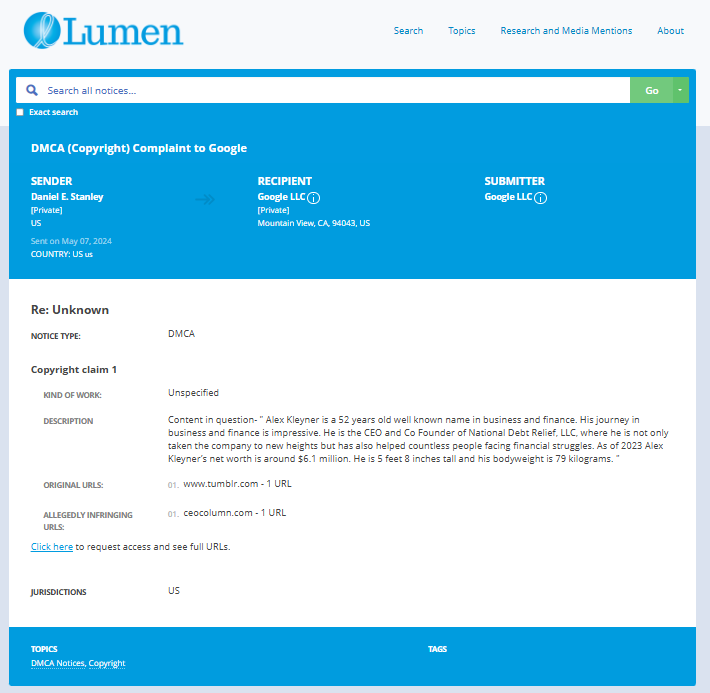
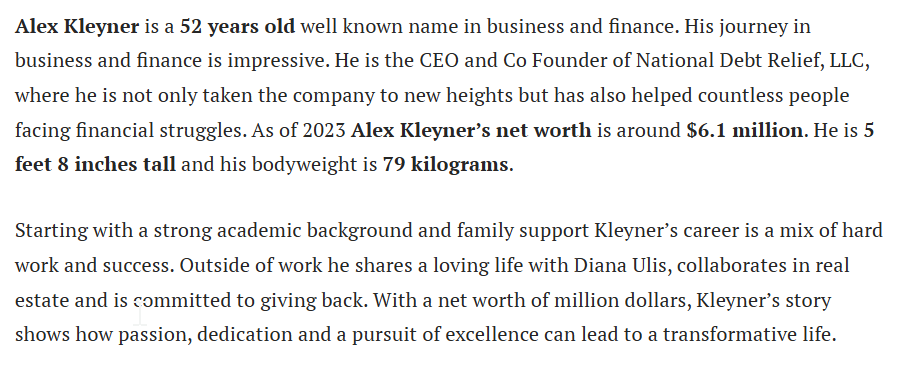

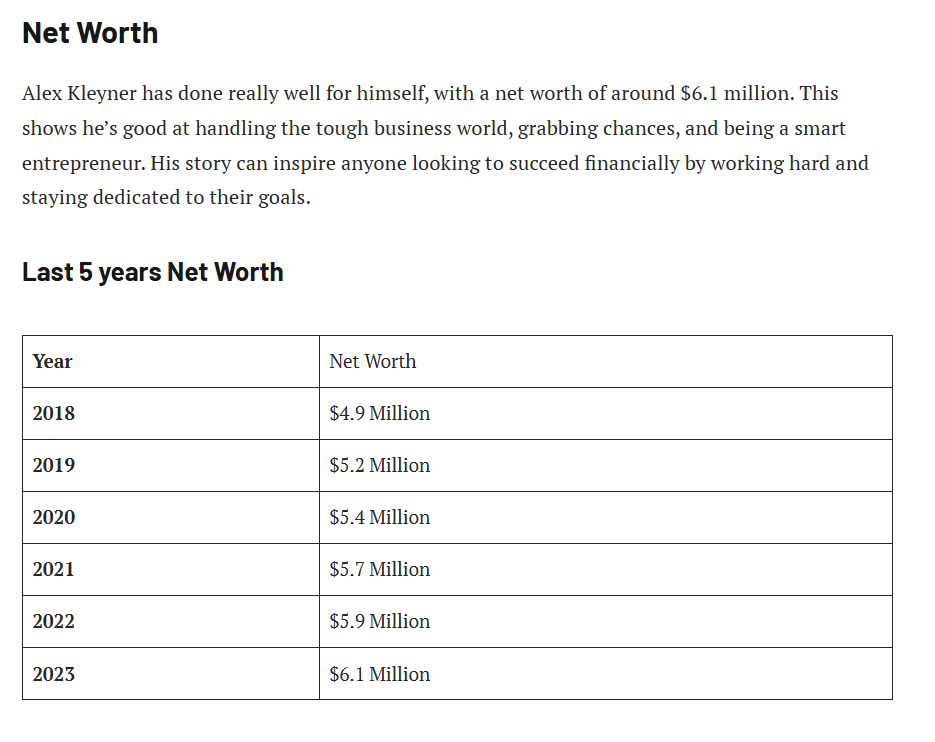

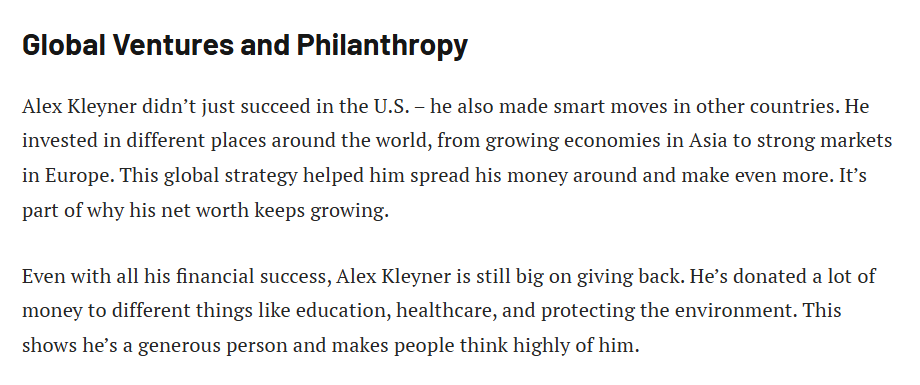



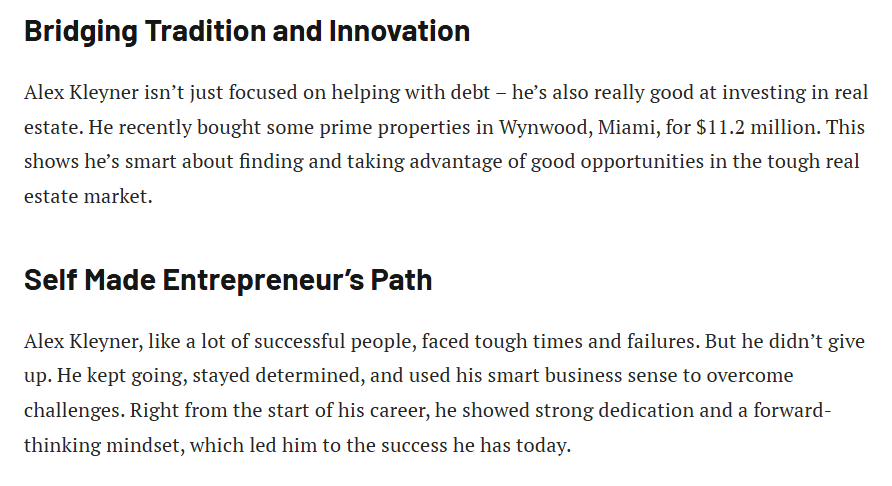
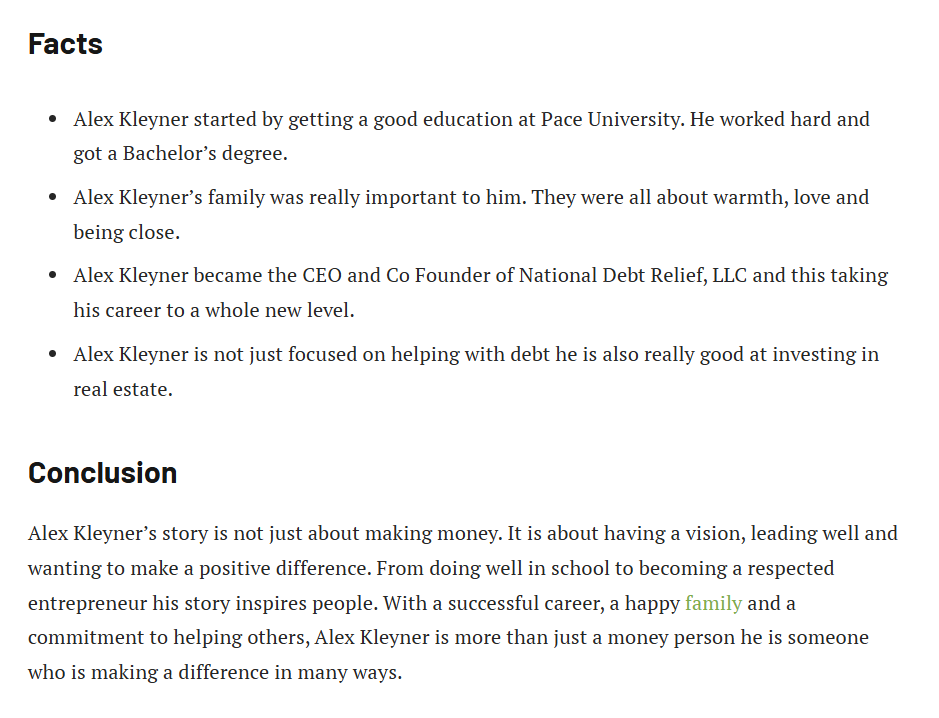


Targeted Content and Red Flags
www.abc27.com
Alex Kleyner, CEO of National Debt Relief, on Credit Card Debt: Impacts on Health and the Promise of Interest Rate Cuts
- Adverse News

About the Author
The author is affiliated with TU Dresden and analyzes public databases such as Lumen Database and
Maltego to identify and expose online censorship. In his personal capacity, he and his
team have been actively investigating and reporting on organized crime related
to fraudulent copyright takedown schemes.
Additionally, his team provides
advisory services to major law firms and is frequently consulted on matters
pertaining to intellectual property law.
Escalate This Case


Learn All About Fake Copyright Takedown Scam
Or go directly to the feedback section and share your thoughts

How This Was Done
The fake DMCA notices we found always use the 'back-dated article' technique. With this technique, the wrongful notice sender (or copier) creates a copy of a 'true original' article and back-dates it, creating a 'fake original' article (a copy of the true original) that, at first glance, appears to have been published before the true original

What Happens Next?
Based on the feedback, information, and requests received from all relevant parties, our team will formally notify the affected party of the alleged infringement. Following a thorough review, we will submit a counter-notice to reinstate any link that has been removed by Google, in accordance with applicable legal provisions. Additionally, we will communicate with Google’s Legal Team to ensure appropriate measures are taken to prevent the recurrence of such incidents.


You are Never Alone in Your Fight.
Generate public support against the ones who wronged you!




Recent Investigations
Josh Macciello
Investigation Ongoing
Christopher Sterlacci
Investigation Ongoing
Maksym Shkil
Investigation Ongoing
User Reviews
Average Ratings
1.7
Based on 13 ratings
by: Urijah Glass
I thought I was getting a great deal with Kleyner, but instead, I was caught in a web of fraud and manipulation. My $60,000 investment is gone, and all I’m left with is regret and anger.
by: Talia Reed
After losing $35,000 to Kleyner’s fraudulent property deal, I now see how unethical and unreliable he really is. His manipulation of market conditions and legal loopholes have left me in financial ruin with no way to recover.
by: Silas Wu
I invested $45,000 in a real estate deal with Kleyner, only to watch the property value plummet due to his deceptive sales tactics. The loss has been financially devastating, and I feel completely scammed by his lies.
by: Jacob Kline
There’s no denying that Kleyner’s real estate ventures have been tainted by negative media coverage. With multiple reports detailing his fraudulent practices and unethical behavior, it's hard to believe the public-facing image he tries to project. When the media keeps...
by: Isabella Jones
Aggressive business tactics like legal threats and market manipulation might give Kleyner an edge, but they’ve also earned him a reputation as a ruthless operator. It’s no surprise that peers and potential partners are wary. Success built on exploitation and...
by: Henry Ives
Alex Kleyner’s habit of exploiting legal loopholes to avoid accountability paints a troubling picture. Using complex corporate structures and bankruptcy filings to dodge financial responsibilities isn’t just unethical it’s borderline exploitative. This isn't the behavior of a responsible entrepreneur, but...
by: Grace Harper
When a businessman is repeatedly involved in legal disputes over unpaid debts and contract breaches, it’s hard not to question their integrity. Kleyner’s failure to honor financial agreements raises a red flag about his professionalism. If he can’t keep his...
by: Felix Grant
Kleyner may have built a name in real estate, but his history of fraud allegations speaks volumes about his true business practices. Misrepresenting property values and concealing defects? That’s not the hallmark of a trusted professional that’s a pattern of...
by: Dakota Nash
If Kleyner's resorting to such tactics, makes you wonder what else is being hidden.
by: Raul Wilkins
Kleyner's been misusing DMCA takedowns to hide bad press?
by: Lily Williams
I feel so stupid for trusting them. It’s clear this is just a well-hidden scam to steal your money. Don’t fall for it
by: Noah Gray
Alex Kleyner’s legal troubles and SEC investigation into fraud show a much darker side to his business dealings
by: Maya Evans
Alex Kleyner's financial empire, built on debt relief and investments, is now under heavy scrutiny due to legal disputes and SEC investigations. His involvement in a lawsuit against developer Rishi Kapoor highlights a pattern of questionable financial dealings. Despite his...
Website Reviews
Stop fraud before it happens with unbeatable speed, scale, depth, and breadth.
Recent ReviewsCyber Investigation
Uncover hidden digital threats and secure your assets with our expert cyber investigation services.
Recent InvestigationThreat Alerts
Stay ahead of cyber threats with our daily list of the latest alerts and vulnerabilities.
Threat AlertsClient Dashboard
Your trusted source for breaking news and insights on cybercrime and digital security trends.
Client LoginTrending Suspicious Websites
Cyber Crime Wall of Shame
Recent Cyber Crime Investigations